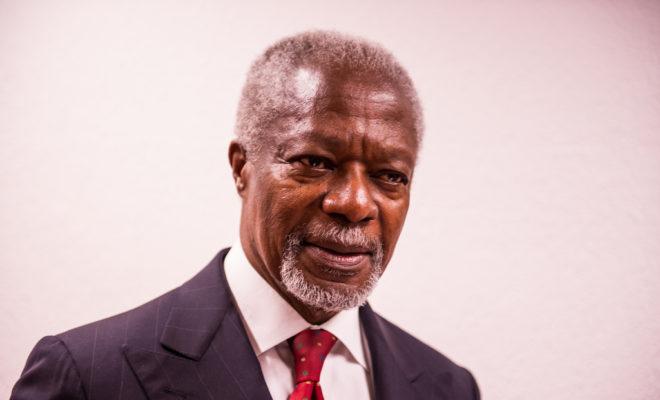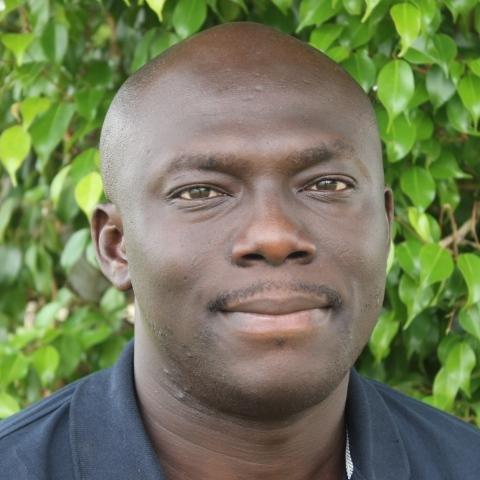Kofi Annan’s quest for a better Africa

As Kofi Annan receives a three-day state funeral in Ghana, we should take the opportunity to celebrate and remember his vision and optimism.

Kofi Annan passed away on 18 August after a short illness aged 80. Credit: ITU/ J.M. Planche.
Tributes to Kofi Annan on his extraordinary accomplishments as UN Secretary-General from 1997 to 2006 have poured in since he passed away on 18 August. They have been well-deserved. His achievements are towering.
I am honoured to have called him a friend and to have worked alongside him, learned from him, and been inspired by him. He became my boss in 1997, having replaced Boutros Boutros Ghali at the helm of the UN. Two years prior, Ghali had appointed me as a UN Under-Secretary-General and the Executive Secretary of the Economic Commission for Africa (ECA). I held that post until 2005, so Kofi’s tenure at the UN and mine overlapped for a decade. We worked together closely during that time and stayed in contact afterwards.
Throughout my association with Kofi, I was convinced that, in his quest for a more peaceful world, he was driven by the desire to see a prosperous Africa. That desire drove his emphasis on halving poverty by 2015, the ultimate objective of the UN Millennium Development Goals (MDGs), which set aggressive and unprecedented benchmarks for progress.
Kofi also pushed for a doubling of development financing from rich to poorer countries. Determined to improve health conditions in the developing world, he established the Global Fund in 2002 to mobilise billions of dollars to combat AIDS and slow the HIV pandemic as well as treat other infectious diseases. Equally important were his recognition that gender equality was a moral imperative and the key to a more prosperous Africa, his passion to reform agriculture to help Africa feed itself, and his efforts to bring greater transparency to Africa’s relations with the developed world.
As head of the ECA, I had the good fortune to work with Kofi on many issues around the turn of the century. He was my inspiration for several initiatives – including the African Peer Review Mechanism and the New Partnership for African Development – the ECA spearheaded in collaboration with African leaders. As a result of our collaboration, I came to observe first-hand the abundant charisma, style, and sincerity that accorded Kofi so much respect and admiration worldwide.
For example, in 1998, Kofi and a few African leaders joined more than 1,000 participants at a conference the ECA convened in Addis Ababa. The meeting focused on the role of African women in economic development. During a panel with the African leaders, the discussion turned to the issue of ministerial quotas for women. One leader responded that when selecting his own appointments, he believed foremost “in competence” and “not necessarily women.”
Kofi responded before anyone else had a chance: “I am sure some of the men in your Cabinet turn out to be incompetent,” he said. “Why don’t you give women a chance? They have a right to be incompetent too.”
The audience exploded in applause.
I last visited Kofi four months ago in Geneva. I presented him with the manuscript of a book soon to be published. It recounts the lessons of African development over the last five decades, and I asked Kofi if he would provide a foreword. He readily agreed, sending his two-page contribution a few weeks later. He used the occasion to articulate two factors that will shape the future of Africa.
Firstly, he wrote that Africa’s transformation will “require many things, especially sound leadership”. But he warned against the “litany of selfish, dangerous, or destructive leaders that have greatly exacerbated the many challenges that independent Africa faced”. Instead, he wrote, “strong and capable states that manage their resources well, provide visionary leadership, and reject authoritarianism and corruption are the ones best placed to make lasting gains”.
Secondly, he reiterated his belief that the drivers of these gains will be Africa’s growing youth population. “Throughout my career I have always been struck by the energy, talent and appetite for knowledge of the continent’s youth,” he wrote. “They want to create a better and more just world, and I am convinced they have the ambition and tools, especially through new forms of technology, to do so.”
As the Financial Times noted after his death, Kofi Annan often said that he was never going to stop being an optimist because if he did, it meant he had given up. And he was never going to give up. Yet, as he once told me: “Optimism should not be mistaken for romanticism; rather it is tempered by realism even as we strive continuously for improvements in the human condition”.
As we mourn his passing, we should celebrate his life and remember him as he lived: as a kind and remarkable man, a visionary leader and humanitarian, and a proud and inspiring African who strove continuously for an end to poverty and a prosperous Africa.






